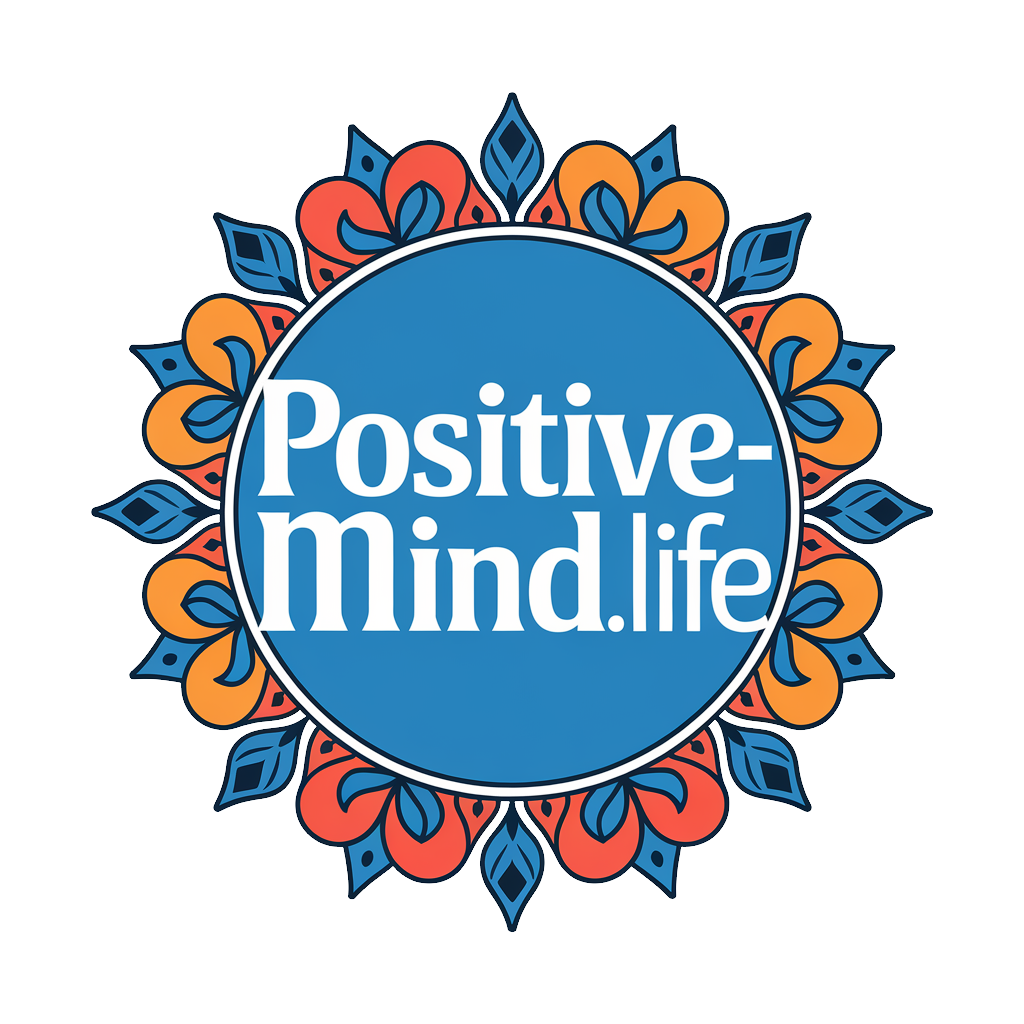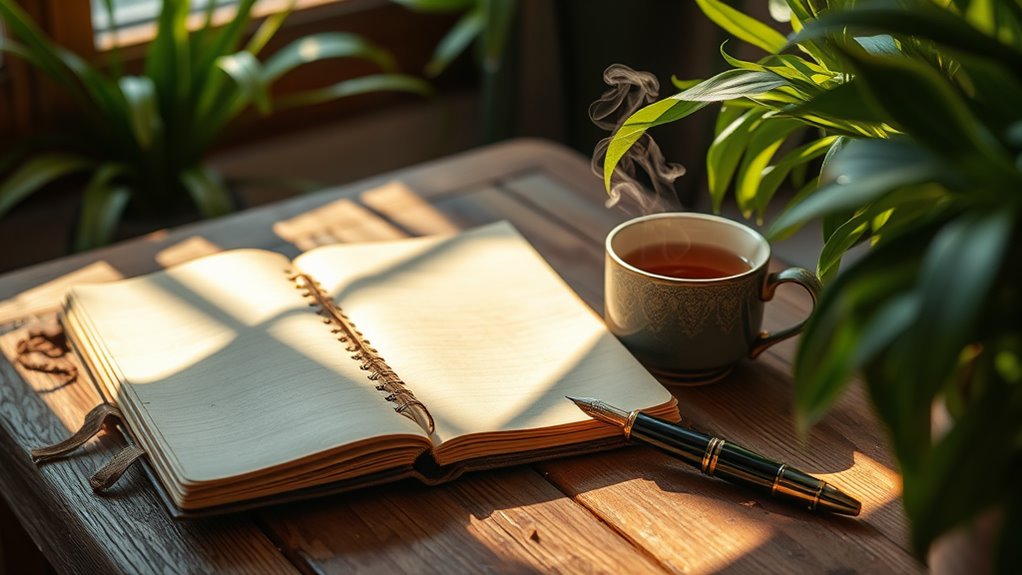How Journaling Can Be Your Ultimate Stress-Buster!
Journaling can be your ultimate stress-buster! It helps you process thoughts and emotions, turning chaos into clarity. When you put pen to paper, you reflect on your challenges and gain new perspectives. This simple act fosters emotional intelligence, allowing you to identify stressors and release pent-up feelings. By setting aside a few moments to jot down your thoughts, you can create a consistent outlet for emotional expression. Plus, establishing a cozy journaling space can enhance this experience. If you’re curious about effective techniques and how to make journaling fit seamlessly into your routine, there’s much more to explore.
Key Takeaways
- Journaling clarifies emotions and identifies stressors, allowing for better understanding and management of stress levels.
- It fosters self-reflection, providing new perspectives on challenges and promoting emotional intelligence.
- Engaging in gratitude lists shifts focus towards positivity, enhancing mood and reducing stress.
- Establishing a dedicated journaling routine creates a consistent outlet for emotional expression and stress relief.
- Overcoming barriers like time constraints and perfectionism ensures regular journaling, leading to measurable progress in stress reduction.
Understanding Stress and Its Effects
Stress is a natural response to the challenges life throws your way, and understanding its effects can be the first step toward managing it effectively. You might notice that certain stress triggers—like looming deadlines, interpersonal conflicts, or financial concerns—can lead to a range of emotional and physical reactions. Recognizing these triggers is crucial, as it empowers you to address them head-on.
When stress hits, your body releases hormones that prepare you for fight or flight, which can be useful in short bursts. However, chronic stress can lead to fatigue, anxiety, and even health issues if left unchecked. It’s essential to cultivate effective coping mechanisms to counteract these effects. Whether it’s practicing mindfulness, engaging in physical activity, or simply taking a break, finding what works for you can provide relief and restore balance.
Reflecting on your responses to stress can deepen your understanding of how it affects you personally. By identifying your unique stress triggers and implementing tailored coping strategies, you’ll not only navigate challenges with greater ease but also enhance your overall well-being. Embrace this journey of self-discovery, and remember, it’s okay to seek support along the way.
Benefits of Journaling for Stress Relief
When life feels overwhelming, journaling can be a powerful tool for stress relief. Engaging in therapeutic writing allows you to process your thoughts and feelings, creating a safe space for emotional expression. By putting pen to paper, you can clarify your emotions, identify stressors, and even discover patterns in your thinking that may contribute to your stress.
Writing in a journal fosters self-reflection, enabling you to distance yourself from immediate worries. This distance can offer new perspectives, helping you approach challenges with a clearer mind. When you articulate your thoughts, you’re not just venting; you’re actively working through your emotions, which can lead to resolution and relief.
Moreover, journaling can serve as a release valve for pent-up emotions. Instead of letting stress simmer beneath the surface, you can confront it directly. This practice not only reduces anxiety but also enhances your emotional intelligence. Over time, you’ll likely notice that journaling becomes a habit, offering you a consistent outlet for processing life’s ups and downs. Embrace journaling as a vital part of your self-care routine, and watch how it transforms your approach to stress.
Effective Journaling Techniques
Clarity is essential when it comes to effective journaling techniques that can enhance your stress relief journey. One of the most impactful methods is using reflective prompts. These questions guide your thoughts, helping you dive deeper into your feelings and experiences. For instance, ask yourself, “What am I feeling right now, and why?” This not only fosters self-awareness but also provides an outlet for emotions that might otherwise bottleneck.
Another powerful technique is creating gratitude lists. Each day, jot down three to five things you appreciate, no matter how small. This shifts your focus from stressors to positive aspects of life, fostering an uplifting mindset.
To master journaling, set aside dedicated time for these practices. Consistency is key; consider journaling at the same time daily or weekly. As you incorporate reflective prompts and gratitude lists, you’ll notice a gradual shift in your perspective, enabling you to manage stress more effectively.
Setting Up Your Journaling Space
Creating a dedicated space for journaling can significantly enhance your experience and provide a sense of calm. You’ll want to choose a comfortable location where you feel at ease, and gather essential supplies that inspire you to write. This simple setup can transform your journaling practice into a cherished moment of reflection and stress relief.
Choose a Comfortable Location
Finding the right spot for your journaling can make all the difference in your experience. It’s essential to choose a location that aligns with your personal preferences, creating a calming atmosphere where you can reflect without distractions. Whether it’s a cozy corner in your living room, a quiet nook at a café, or a serene park bench, consider what makes you feel most at ease.
Think about factors like lighting, noise levels, and comfort. Natural light can uplift your mood, while soft lighting can create a peaceful environment. If you prefer silence, seek a spot away from bustling areas. On the other hand, some find inspiration in gentle background sounds.
Your location preferences are personal, so listen to what resonates with you. Don’t hesitate to experiment with different spaces until you find one that feels just right. This isn’t just about physical comfort; it’s about setting the stage for a deeper connection with your thoughts. A dedicated, inviting space fosters creativity and encourages you to dive into your feelings, ultimately enhancing your journaling practice. Remember, this is your time—make it count by choosing a place that truly supports your journey.
Gather Essential Supplies
Gathering essential supplies for your journaling practice can significantly enhance your experience and help you express your thoughts more freely. When you have the right journaling supplies at hand, you’ll find it easier to immerse yourself in your reflections. Think of this as setting the stage for your inner dialogue.
Consider these essential tools to elevate your journaling experience:
- A quality journal: Choose one that resonates with you, whether it’s lined, blank, or dotted.
- Writing instruments: Pick your favorite pens or pencils; some people prefer gel pens for smooth writing.
- Highlighters or markers: Use these to emphasize key thoughts or feelings, adding vibrancy to your entries.
- Sticky notes: These are great for jotting down quick ideas or reminders you’d like to revisit.
- A cozy blanket or cushion: Creating a comfortable environment encourages longer, more enjoyable journaling sessions.
Promoting Mindfulness Through Writing
Writing can serve as a powerful tool for cultivating mindfulness, allowing you to tune into your thoughts and feelings with greater clarity. When you engage in this practice, you create a space for mindful reflections. This practice encourages you to pause and examine your inner landscape, fostering a deeper understanding of your emotions.
As you write, focus on the sensations and thoughts that arise. Don’t rush; let your pen flow freely. This process enhances your emotional expression, enabling you to articulate feelings that might otherwise remain buried. By putting your experiences into words, you gain insight into your reactions and patterns, which can be incredibly liberating.
With each entry, you’ll find that the act of writing becomes a meditation in itself. It’s not just about recording events but about exploring your emotional journey. This self-exploration promotes mindfulness, grounding you in the present moment.
Incorporating this practice into your routine can transform your relationship with stress. By fostering mindfulness through writing, you empower yourself to navigate your emotions with intention and grace, paving the way for healing and personal growth.
Creating a Consistent Journaling Habit
Regularly setting aside time for journaling can significantly enhance your overall wellbeing and help you manage stress more effectively. To create a consistent journaling habit, it’s important to find a rhythm that works for you. Here are some tips to help you establish that routine:
- Choose a specific time: Whether it’s in the morning or before bed, pick a time that you can commit to daily.
- Set reminders: Use your phone or calendar to remind you of your journaling time until it becomes a natural part of your day.
- Keep it simple: Start with just a few minutes of writing, focusing on daily reflections.
- Use journaling prompts: These can spark creativity and help you express your thoughts and feelings more freely.
- Celebrate progress: Acknowledge the effort you put into your journaling journey, no matter how small.
Frequently Asked Questions
Can Journaling Replace Therapy for Stress Management?
Journaling can’t fully replace therapy for stress management, as therapy offers professional guidance and deeper insights. However, journaling benefits like emotional clarity and self-reflection can complement therapy, helping you explore thoughts and feelings more effectively.
What Types of Journals Are Best for Stress Relief?
Did you know that 77% of people experience stress regularly? For relief, try gratitude journals, bullet journaling, or creative writing with guided prompts. Each type helps channel emotions and fosters mindfulness, enhancing your well-being.
How Long Should I Journal Each Day?
You should aim for 10 to 20 minutes daily. This timeframe allows you to experience journaling benefits without feeling overwhelmed. Integrating it into your routine fosters reflection and deepens your self-understanding over time.
Can I Use Digital Journaling Apps Effectively?
Absolutely, you can use digital journaling effectively! Explore app features like prompts, reminders, and mood trackers. They make your journaling experience more engaging, helping you reflect deeply and master your thoughts in a convenient way.
Is There a Specific Time of Day to Journal?
Ever heard of the golden hour? It’s perfect for your morning routine, setting intentions. Alternatively, evening reflection helps you unwind. Choose a time that resonates with you, and commit to creating a meaningful journaling habit.


